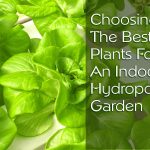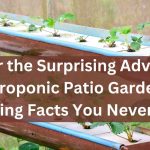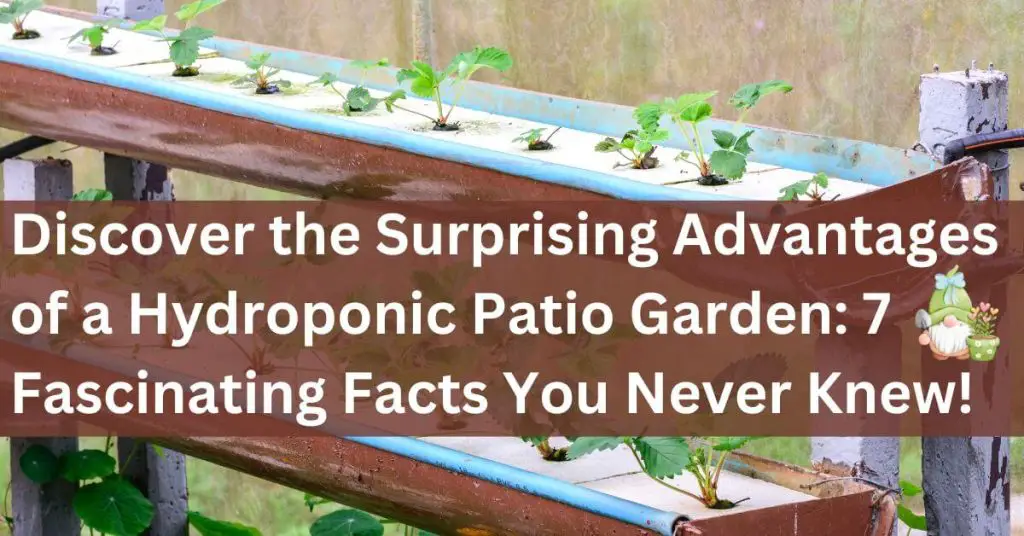Hydroponic gardening can be challenging due to issues such as nutrient imbalances, pest infestations, and equipment failures. Hydroponic gardening is a popular cultivation method that allows plants to grow without soil.
Although hydroponics has many advantages, including faster growth rates, less water usage, and higher yields, there are also several risks and disadvantages that can arise. One common issue is nutrient imbalances, which can occur when the solution ph or nutrient concentration is incorrect.
Another problem is pest infestations, as hydroponic gardens can attract insects, mites, and other harmful pests. Additionally, hydroponic equipment can malfunction or break down, causing damage to plants or the system as a whole. Despite these challenges, hydroponics remains a popular option for many growers due to its numerous benefits and potential for success.
:max_bytes(150000):strip_icc()/hydroponic-nutrient-solution-basics-1939228-hero-baea6e3ce7b443159da0db779258f98d.jpg)
Credit: www.thespruce.com
Common Problems And Solutions
Hydroponic gardening is an exciting and innovative way to grow plants without soil. Although hydroponics has numerous benefits, it is not without its challenges. In this section, we will take a deep dive into common hydroponic gardening problems and their solutions.
Pests And Diseases
Pests and diseases can be disastrous for hydroponic gardening, but there are ways to prevent and control them. Here are some common problems and solutions to keep your hydroponic garden pest and disease-free:
- Aphids, mites, and whiteflies are common pests in hydroponic gardening. Install insect screens and sticky traps to control pests, and use organic pesticides like neem oil or insecticidal soap.
- Diseases like root rot, powdery mildew, and blight can harm the plant’s roots, leaves, and stems. To prevent disease, make sure your hydroponic system is clean and sterile. Use hydrogen peroxide or bleach to clean your equipment regularly.
- Nutrient deficiencies can also make plants vulnerable to disease. Ensure that your plant has all the necessary nutrients to grow healthy and strong.
Nutrient Imbalance
As a hydroponic gardener, you need to ensure that your plants are getting the right nutrients in the right amounts. Otherwise, the plants will suffer from nutrient imbalance. Here are some common nutrient-related problems and solutions:
- Macro and micronutrient deficiencies are common problems in hydroponic gardening. Make sure to check the ph level of your nutrient solution regularly and adjust accordingly. You may need to supplement your nutrient solution with additional minerals in powdered or liquid form.
- Overfertilization is also a problem in hydroponic gardening. Too much fertilizer can damage the plant’s roots and stunt growth. Make sure to follow the recommended dosage and flush the system regularly to prevent fertilizer buildup.
Temperature Fluctuations
Temperature plays a crucial role in hydroponic gardening. If the temperature is too high or too low, it can stress the plant and reduce growth. Here are some common temperature-related problems and solutions:
- High temperatures can cause the plant’s leaves to wilt and turn yellow. Install a fan or ventilation system to regulate the temperature of your hydroponic system. You may also need to install a cooling system like an air conditioner.
- Low temperatures can slow down plant growth and make the plant more susceptible to disease. Install a heater or insulation to keep your hydroponic system warm in colder months.
Lighting Issues
Light is an essential factor in hydroponic gardening. Without sufficient light, plants will not be able to grow properly. Here are some common lighting problems and solutions:
- Insufficient light can result in weak and stunted plants. Make sure to provide your plants with adequate light by installing grow lights like led, hps or fluorescent lamps.
- Excessive light can also damage the plant’s leaves and stunt growth. Make sure to follow the recommended hours of light exposure for different plant varieties.
Hydroponic gardening is a rewarding and innovative way to grow healthy plants. By being aware of common problems and their solutions, you can ensure that your hydroponic system thrives and produces a bountiful harvest.
Technical And Maintenance Issues
Hydroponic gardening requires a bit of technical know-how, maintenance, and troubleshooting when issues arise. Here are some common technical and maintenance issues that you may encounter:
Water Quality Problems
- Poor water quality can cause plant growth to suffer or even die. Some of the most common water quality issues are ph imbalance, nutrient deficiency, and algae growth.
- Ph imbalance: The optimal ph for hydroponic gardening is between 5.5 and 6.5. If the ph drops too low or goes too high, it can negatively impact plant growth. To fix this, test the ph level of the water regularly and adjust it with appropriate chemicals.
- Nutrient deficiency: Plants require a balance of nutrients to grow, but excessive nutrients can be just as harmful as insufficient nutrients. Monitor nutrient levels and adjust accordingly, so they stay at the right levels for healthy plant growth.
- Algae growth: Algae can grow quickly and suffocate the plants. Keep the water temperature below 70°f and avoid direct sunlight exposure to decrease algae growth.
System Failures
- System failures can pose a serious threat to your plants’ health. Some issues include pump failure, power outages, and clogged irrigation systems.
- Pump failure: Without an operating pump, the water and nutrients cannot circulate, which means your plants will not receive enough nutrients to thrive. Test your pump regularly and have a replacement on hand.
- Power outages: Power outages can affect the system’s operations causing damage to plants. In case of electric grid interruptions, use backup generator or battery supply to power the system.
- Clogged irrigation systems: Dirt buildup in the irrigation may obstruct the delivery of the nutrient-filled water, leading to many deficiencies, monitor and replace the hoses and pipes regularly.
Unfavorable Environmental Conditions
- Unfavorable environmental conditions can damage the hydroponic system and stress your plants.
- Temperature: Plants prefer temperatures between 65-75°f. High temperatures can damage the roots and cause slow growth. Low temperatures reduce plant respiration and stunt growth.
- Humidity: The optimal range for hydroponic cultivation is 40-60%. Too low humidity levels can cause stress, and too high humidity can encourage fungal growth on the plants.
- Light: The intensity and duration of light greatly influence plant growth and yield. Use a timer to ensure plants receive an adequate amount of light and avoid direct light exposure.
Hydroponics gardening is a perfect way to enjoy fresh produce right at home. However, technical and maintenance issues can arise and damage your plants. Monitor your system and maintain it properly to ensure your plants’ health and yield.
Frequently Asked Questions On What Can Go Wrong With Hydroponic Gardening?
What Are Common Problems With Hydroponic Gardening?
Common problems with hydroponic gardening include nutrient imbalances, pests and diseases, ph fluctuations, and equipment malfunction. Ensuring proper maintenance and monitoring can prevent or solve these issues.
Can Plants Die In Hydroponics Due To Lack Of Oxygen?
Yes, plants can die in hydroponics due to lack of oxygen. Oxygen is necessary for root growth and cellular respiration. Providing adequate aeration through air pumps and stone diffusers can prevent this problem.
Do Hydroponic Systems Require More Maintenance Than Traditional Gardening?
Hydroponic systems require regular maintenance such as checking nutrient levels, ph, and water temperatures. However, they generally require less maintenance than traditional gardening as there is no weeding or soil preparation required.
How Do You Prevent Algae Growth In Hydroponic Systems?
Algae growth in hydroponic systems can be prevented by providing adequate light barriers, reducing nutrient levels, proper system sanitation, and use of beneficial bacteria or algae-eating fish.
Can Hydroponic Gardening Be Cost-Effective?
Hydroponic gardening can be cost-effective in the long run as it uses less water and space, and can yield higher crop yields. However, initial setup costs can be higher compared to traditional gardening.
Is Hydroponic Gardening Suitable For All Types Of Plants?
Hydroponic gardening can be used for a wide range of plants, but some do better than others. Plants that have shallow roots and grow quickly such as lettuce, herbs, and strawberries, are ideal for hydroponic systems.
Conclusion
Overall, hydroponic gardening can provide a sustainable and efficient way to grow plants without soil. This method of gardening can be ideal for those with limited space, and it can produce higher yields than traditional soil gardening. However, there are potential issues that can arise when practicing hydroponic gardening.
Maintaining proper ph levels, adequate nutrient levels, and preventing pests and diseases are all critical to the success of a hydroponic garden. Additionally, power outages can interrupt the necessary supply of water and nutrients, causing damage to the plants. Overall, with careful planning and regular maintenance, hydroponic gardening can be a rewarding and fruitful experience.
By understanding and addressing these potential issues, you can enjoy healthy and thriving plants while taking advantage of the unique benefits of this innovative gardening technique.

“My name is Leo Jacob, and I hold a Bachelor of Science degree with Honors in Applied Environmental Science and Sustainability from the University of the West of Scotland. Since childhood, I’ve been passionate about living an eco-friendly life. After completing my studies, I dedicated myself to finding simple ways to lead a more environmentally conscious lifestyle. I launched ecolifely.com to share my educational background and practical experiences with everyone, hoping to inspire others to join me in creating a greener, more sustainable world.”




